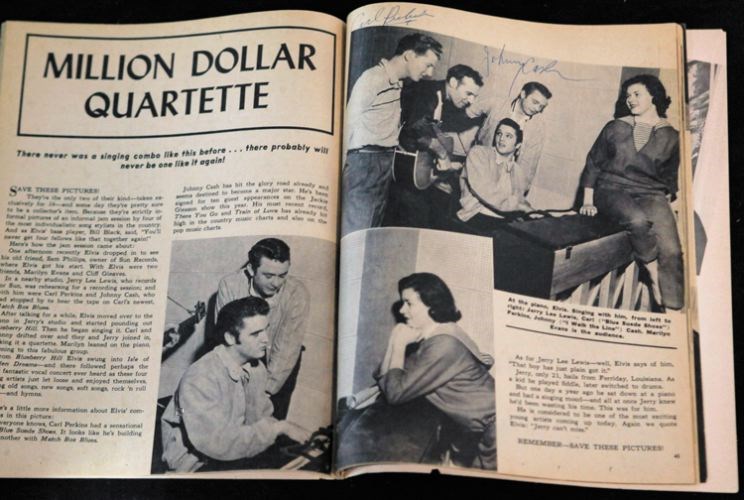Tonight, Theatre Northwest will celebrate the 62nd anniversary of the Million Dollar Quartet session before the performance of the acclaimed play based on that incredible meeting. On Dec. 4, 1956, Elvis Presley, Johnny Cash, Jerry Lee Lewis and Carl Perkins came together at Sun Records in Memphis to play.
Before tonight's performance, TNW's artistic director (and walking/talking music encyclopedia on top of his own musical talents) Jack Grinhaus will give a talk at
7 p.m. in the lobby about the historic session, before theatre
goers can take in the show at
8 p.m. (sorry, tonight's show is sold out, as is most of the run but extra shows have been added through Dec. 20).
Grinhaus's talk will set the scene for this amazing gathering of four giants of 20th century American music.
The four men had far more in common than just the songs.
They were all young - Perkins and Cash were both 24 while Lewis and Presley were just 21.
They were all Southern men, born poor in small towns in Arkansas, Mississippi, Louisiana and Tennessee.
What they all lacked in confidence and polish, they more than made up for with raw talent and fierce determination. If there was a decent living to be made recording and performing popular music, they wanted in on some of that action.
It was also a time of boundless opportunity. The post-war American economy was booming and modern technology and wealth were transforming the country. Yet much of that change was happening in the urban centres, while the rural areas, particularly in the South, remained as poor and isolated as they had been for generations.
Like all young men - and especially the ones who grew up in small towns but came to the big city for work and to escape the poverty - these four burgeoning musicians had huge chips on their shoulders. They were all, to varying degrees, angry, ambitious, stubborn, proud, resentful, respectful of authority and tradition but rebellious at the same time.
Like all young men, they quickly recognized their brotherly kinship but also sized each other up as competitors.
They were also the right men in the right place at the right time. Like all artists who find success, particularly at a young age, they sang songs that moved them and were surprised to find there were millions of people, not just in the United States but around the world, who felt the same.
Their road to musical immortality had already been paved before them, by young Southern black men who went to Chicago, plugged in electric guitars and played the blues, or went to Detroit and played soul music. The same path would be taken a decade later and an ocean away by similarly inspired, talented and driven young men named John and Paul, Mick and Keith, Pete and Roger.
It would happen again in the late 1970s and early 1980s in the boroughs of New York City, as DJs started talking over dance records and then used the new technology to stitch bits and pieces of songs together while rapping words over top.
The common thread for all of them was a homegrown music that easily translated to broader audiences, performed by ambitious young men (and a handful of women) who loved the spotlight and the pay cheques (and not necessarily in that order).
The music of the Million Dollar Quartet is fabulous, of course, but the back story, both of that special day and of its four amazing participants, is even more incredible.
If you've got tickets for tonight, don't miss out on this opportunity to hear the rest of the story.
Not only will you not be disappointed, you'll come away with an even greater appreciation of those four great musicians and their timeless songs.
-- Editor-in-chief Neil Godbout



